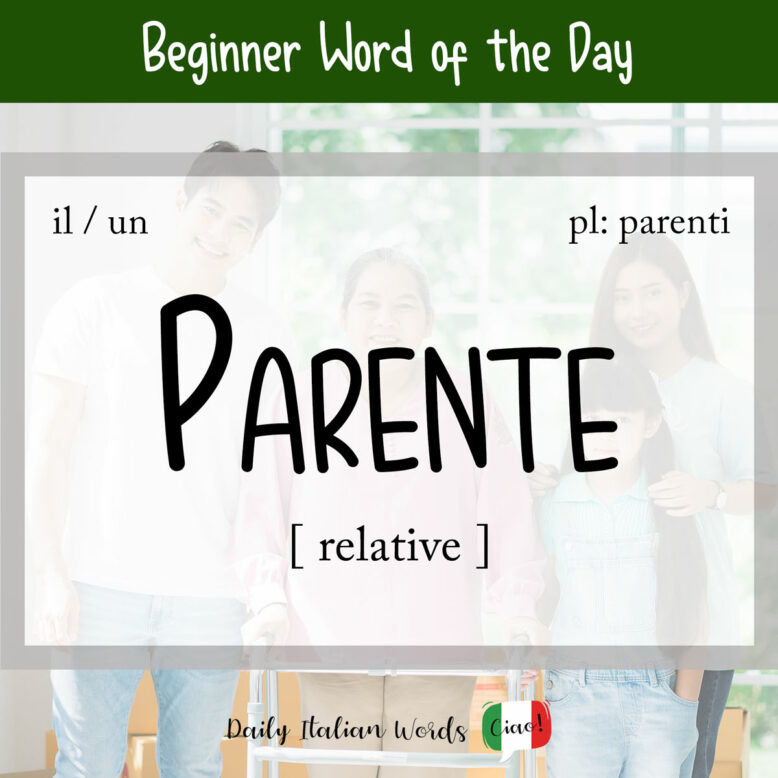A word that many English speakers find confusing when they first start learning Italian is parente (masculine and feminine, plural: parenti).
Despite bearing a strong resemblance to the English word parent, it actually means relative or family member in modern Italian. Both parente and parent derive from the Latin parens whose meaning is the same as the English word.

Note: To add to the confusion, parente did originally mean parent in ancient Italian but this term was later replaced with the word genitore.
A close relative or next of kin is called a parente stretto (lit: tight relative) or parente prossimo (lit: next relative) whereas a distant relative is known as a parente lontano / alla lontana.
If you marry into another family, the family members on your husband or wife’s side are called parenti acquisiti (lit: acquired relatives), the term for in-laws in Italian. Whereas in English we append the words “in-law” to the end of another word to specify the role of the family member (e.g. brother-in law), Italian has different names for each person. For example:
- suocero / suocera = father-in-law / mother-in-law
- cognato / cognata = brother-in-law / sister-in-law
- genero = son-in-law
- nuora = daughter-in-law

To say that you are related to someone, you can use the following expressions for male and female subjects:
Alessio è un mio parente.
Alessia è una mia parente.
Alessio is a relative of mine.
Alessia is a relative of mine.
Io e Alessio siamo parenti.
Io e Alessia siamo parenti.
Alessio and I are related.
Alessia and I are related.

You can also define your relationship to someone according to degrees of kinship (gradi di parentela). Those we consider family are generally parenti di primo grado (first-degree family members), secondo grado (second-degree) and terzo grado (third-degree).
First-degree family links are those between parents (genitori) and children (figli). Second-degree links include brothers (fratelli) and sisters (sorelle), and grandchildren (nipoti) and grandparents (nonni / nonne). At the third degree, there are great-grandparents (bisnonni), uncles (zii) and aunts (zie), and nieces and nephews (nipoti).
In a figurative sense, parente can translate as counterpart or akin. It is used to describe a person or thing that corresponds to or has a strong relationship to another person or thing. For example:
- L’appetito è parente della fame. = Appetite is hunger’s counterpart.
- L’odio è parente dell’amore. = Hate is love’s counterpart.
Two related terms are parentela, which means kin or relatives, and parentale, which means parental or familial.
After publishing this article, our friends at My Italian Circle reminded us of the fun rhyming expression parenti serpenti (lit: snake relatives). It is used to describe the love-hate relationship between relatives who are constantly at each other’s throats. Parenti Serpenti is also the title of a 1992 Italian black comedy film written and directed by Mario Monicelli, whose English name is Dearest Relatives, Poisonous Relations.
Heather Broster is a graduate with honours in linguistics from the University of Western Ontario. She is an aspiring polyglot, proficient in English and Italian, as well as Japanese, Welsh, and French to varying degrees of fluency. Originally from Toronto, Heather has resided in various countries, notably Italy for a period of six years. Her primary focus lies in the fields of language acquisition, education, and bilingual instruction.


